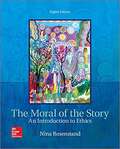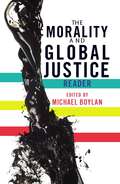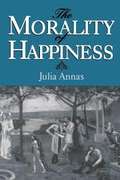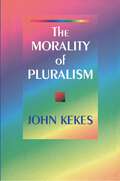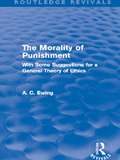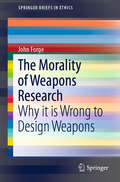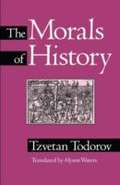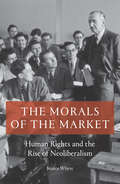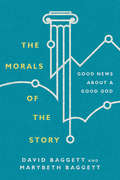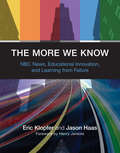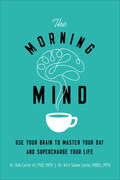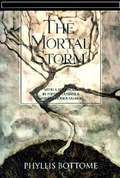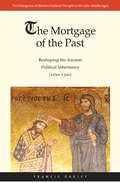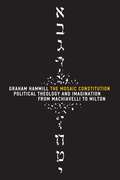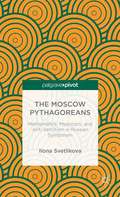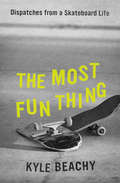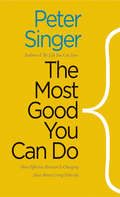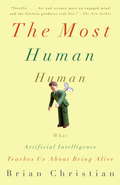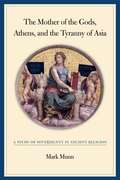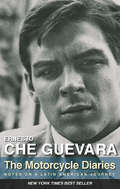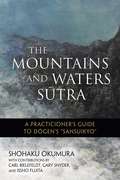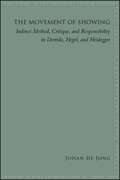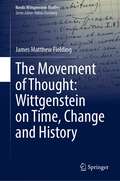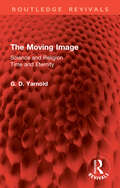- Table View
- List View
The Moral of the Story: An Introduction to Ethics
by Nina RosenstandNow in its eighth edition, The Moral of the Story continues to bring understanding to difficult concepts in moral philosophy through storytelling and story analysis. From discussions on Aristotle’s virtues and vices to the moral complexities of the Game of Thrones series, Rosenstand’s work is lively and relatable, providing examples from contemporary film, fiction narratives, and even popular comic strips. The Connect course for this offering includes SmartBook, an adaptive reading and study experience which guides students to master, recall, and apply key concepts while providing automatically-graded assessments.
The Morality and Global Justice Reader
by Michael BoylanThis cutting-edge volume of original essays features a diverse, international team of prominent scholars examining issues of morality and justice within a global perspective. The chapters are grouped according to an integrative design that progresses from normative principles to normative theories to normative applications. Applications chapters address current significant and provocative topics such as poverty and the global economy; global health; religion; war; and gender, identity, and family. Distinguished philosopher and volume editor Michael Boylan provides a unifying introduction to each section. In addition, an abstract and list of key words provide readers with an informative entry into each reading. An engaging resource for all students of philosophy and politics, The Morality and Global Justice Reader not only offers an essential foundation of global justice and its policy implications, but also aims to inspire readers to positive action for change. A single-authored volume by Michael Boylan, Morality and Global Justice: Justifications and Applications, is also available as a complementary or a standalone text.
The Morality and Global Justice Reader
by Michael BoylanThis cutting-edge volume of original essays features a diverse, international team of prominent scholars examining issues of morality and justice within a global perspective. The chapters are grouped according to an integrative design that progresses from normative principles to normative theories to normative applications. Applications chapters address current significant and provocative topics such as poverty and the global economy; global health; religion; war; and gender, identity, and family. Distinguished philosopher and volume editor Michael Boylan provides a unifying introduction to each section. In addition, an abstract and list of key words provide readers with an informative entry into each reading. An engaging resource for all students of philosophy and politics, The Morality and Global Justice Reader not only offers an essential foundation of global justice and its policy implications, but also aims to inspire readers to positive action for change. A single-authored volume by Michael Boylan, Morality and Global Justice: Justifications and Applications, is also available as a complementary or a standalone text.
The Morality of Happiness
by Julia AnnasAncient ethical theories, based on the notions of virtue and happiness, have struck many as an attractive alternative to modern theories. But we cannot find out whether this is true until we understand ancient ethics--and to do this we need to examine the basic structure of ancient ethical theory, not just the details of one or two theories. In this book, Annas brings together the results of a wide-ranging study of ancient ethical philosophy and presents it in a way that is easily accessible to anyone with an interest in ancient or modern ethics. She examines the fundamental notions of happiness and virtue, the role of nature in ethical justification and the relation between concern for self and concern for others. Her careful examination of the ancient debates and arguments shows that many widespread assumptions about ancient ethics are quite mistaken. Ancient ethical theories are not egoistic, and do not depend for their acceptance on metaphysical theories of a teleological kind. Most centrally, they are recognizably theories of morality, and the ancient disputes about the place of virtue in happiness can be seen as akin to modern disputes about the demands of morality.
The Morality of Pluralism
by John KekesControversies about abortion, the environment, pornography, AIDS, and similar issues naturally lead to the question of whether there are any values that can be ultimately justified, or whether values are simply conventional. John Kekes argues that the present moral and political uncertainties are due to a deep change in our society from a dogmatic to a pluralistic view of values. Dogmatism is committed to there being only one justifiable system of values. Pluralism recognizes many such systems, and yet it avoids a chaotic relativism according to which all values are in the end arbitrary. Maintaining that good lives must be reasonable, but denying that they must conform to one true pattern, Kekes develops and justifies a pluralistic account of good lives and values, and works out its political, moral, and personal implications.
The Morality of Punishment: With Some Suggestions for a General Theory of Ethics (Routledge Revivals)
by Alfred C EwingFirst published in 1929, this book explores the crucial, ethical question of the objects and the justification of punishment. Dr. A. C. Ewing considers both the retributive theory and the deterrent theory on the subject whilst remaining commendably unprejudiced. The book examines the views which emphasize the reformation of the offender and the education of the community as objects of punishment. It also deals with a theory of reward as a compliment to a theory of punishment. Dr. Ewing’s treatment of the topics is philosophical yet he takes in to account the practical considerations that should determine the nature and the amount of the punishment to be inflicted in different types of cases. This book will be of great interest to students of philosophy, teachers and those who are interested in the concrete problems of punishment by the state. It is an original contribution to the study of a subject of great theoretical and practical importance.
The Morality of Weapons Research: Why it is Wrong to Design Weapons (SpringerBriefs in Ethics)
by John ForgeThis book addresses the morality of engaging in weapons research, a topic that has been neglected but which is extremely important. It is argued that this activity is both morally wrong and morally unjustifiable, and this implies that moral persons should not engage in it. The argument is not based on any pacifist assumptions: it is not assumed that neither individuals nor states should not defend themselves. What is wrong with weapons research is that it is the first step in the production of weapons, weapons are the means to harm, and harming without justification is always wrong. Those who study science, for instance those who are interested in the responsibilities of the scientist, are given a new perspective, while those who are practicing scientists will realize that they should not consider working to design new or improved weapons systems. This book is of interest to students and researchers working in ethics and technology, philosophy of technology, military ethics, and history of technology.
The Morals of History (Translation of: Les morales de l'histoire)
by Tzvetan Todorov Alyson WatersThe celebrated theorist Tzvetan Todorov offers here a thought provoking study of the complex relationship between 'ethics' and 'history'. In exploring such issues as how one practices and assesses equality among different societies, Todorov confronts topics ranging from the conquest of America and nineteenth-century colonialism, to democracy and conflicts of the Self versus the Other.
The Morals of the Market: Human Rights and the Rise of Neoliberalism
by Jessica WhyteThe fatal embrace of human rights and neoliberalismWhy did the rise of human rights in the 1970s coincide with the institutionalisation of neoliberalism? And why has the neoliberal age also been the age of human rights? Drawing on detailed archival research on the parallel histories of human rights and neoliberalism, Jessica Whyte uncovers the place of human rights in neoliberal attempts to develop a moral framework for a market society.In the wake of World War Two, neoliberals saw demands for new rights to social welfare and self-determination as threats to &‘civilisation&’. Yet, rather than rejecting rights, they developed a distinctive account of human rights as tools to depoliticise civil society, protect private investments and shape liberal subjects. Honing in on neoliberal political thought, Whyte shows that the neoliberals developed a stark dichotomy between politics, conceived as conflictual, coercive and violent, and civil society, which they depicted as a realm of mutually-beneficial, voluntary, market relations between individual subjects of rights. In mobilising human rights to provide a moral language for a market society, neoliberals contributed far more than is often realised to today&’s politics of human rights.
The Morals of the Story: Good News About a Good God
by David Baggett Marybeth BaggettChristianity Today
The More We Know: NBC News, Educational Innovation, and Learning from Failure
by Eric Klopfer Jason HaasThe rise and fall of iCue: lessons about new media, old media, and education from an NBC-MIT joint venture into interactive learning.In 2006, young people were flocking to MySpace, discovering the joys of watching videos of cute animals on YouTube, and playing online games. Not many of them were watching network news on television; they got most of their information online. So when NBC and MIT launched iCue, an interactive learning venture that combined social networking, online video, and gaming in one multimedia educational site, it was perfectly in tune with the times. iCue was a surefire way for NBC to reach younger viewers and for MIT to test innovative educational methods in the real world. But iCue was a failure: it never developed an audience and was canceled as if it were a sitcom with bad ratings. In The More We Know, Eric Klopfer and Jason Haas, both part of the MIT development team, describe the rise and fall of iCue and what it can teach us about new media, old media, education, and the challenges of innovating in educational media.Klopfer and Haas show that iCue was hampered by, among other things, an educational establishment focused on “teaching to the test,” television producers uncomfortable with participatory media, and confusion about the market. But this is not just a cautionary tale; sometimes more can be learned from an interesting failure than a string of successes. Today's educational technology visionaries (iPads for everyone!) might keep this lesson in mind.
The Morning Mind: Use Your Brain to Master Your Day and Supercharge Your Life
by Rob Carter III Kirti Salwe CarterUnleash positive thinking and productive imagination, and flip negative thoughts and behaviors into a lifetime to improve every aspect of your life—each morning, one day at a time.Bad habits. Bad feelings. Bad mornings that turn into regrettable days. Banish them all with simple brain hacks that flip negative thoughts and behaviors into positive, productive ones.The Morning Mind makes it easy. Based on findings from neuroscience and medicine, Dr. Robert Carter and Dr. Kirti Carter help you tamp down on the fear-driven reptile brain and tap into the part linked to thinking and imagination.With topics ranging from diet and hydration to exercise and meditation, you&’ll find ideas for activating your brain—and improving every aspect of your life:Restore healthy cycles of waking and sleepingBlock harmful cortisol hormonesBoost mental performanceCreate calmer morningsDevelop self-disciplineStimulate creativityImprove your leadership skillsInstead of dragging through your day, learn to wake up refreshed, recharge regularly, and live better than ever. From the moment the alarm clock rings, The Morning Mind helps you greet each day with gusto.
The Mortal Storm
by Phyllis BottomeFreya Roth has everything a young woman could want. Her father is a kind and brilliant professor, her mother loving and beautiful, and there are three fine brothers. She is studying to be a doctor, and her suitro is rich and handsome. Then Hitler comes into power. Her older half-brothers turn against their stepfather, who is Jewish, and both are members of the Nazi Party. At the same time, Freya meets a young Communist peasant with whom she falls in love. Personal and political differences destroy the family's once uncloded happiness, and danger grows for Freya. This book, written in 1938, foreshadowed the horrors of years to come. It was also a feminist statement, made in an entertaining way. A film of this story with James Steward and Margaret Sullivan radically changed the plot although some of the seeds that must have attracted the producers are still there. However, the book is much less conventional and more forthright. "The Mortal Storm" is a poignant, exciting and thought-provoking book.
The Mortgage of the Past
by Francis OakleyFrancis Oakley continues his magisterial three-part history of the emergence of Western political thought during the Middle Ages with this second volume in the series. Here, Oakley explores kingship from the tenth century to the beginning of the fourteenth, showing how, under the stresses of religious and cultural development, kingship became an inceasingly secular institution. “A masterpiece and the central part of a trilogy that will be a true masterwork. ”—Jeffrey Burton Russell, University of California, Santa Barbara
The Mosaic Constitution: Political Theology and Imagination from Machiavelli to Milton
by Graham HammillIt is a common belief that scripture has no place in modern, secular politics. Graham Hammill challenges this notion in The Mosaic Constitution, arguing that Moses's constitution of Israel, which created people bound by the rule of law, was central to early modern writings about government and state. Hammill shows how political writers from Machiavelli to Spinoza drew on Mosaic narrative to imagine constitutional forms of government. At the same time, literary writers like Christopher Marlowe, Michael Drayton, and John Milton turned to Hebrew scripture to probe such fundamental divisions as those between populace and multitude, citizenship and race, and obedience and individual choice. As these writers used biblical narrative to fuse politics with the creative resources of language, Mosaic narrative also gave them a means for exploring divine authority as a product of literary imagination. The first book to place Hebrew scripture at the cutting edge of seventeenth-century literary and political innovation, The Mosaic Constitution offers a fresh perspective on political theology and the relations between literary representation and the founding of political communities.
The Moscow Pythagoreans: Mathematics, Mysticism, and Anti-Semitism in Russian Symbolism
by Ilona SvetlikovaIn Russia at the turn of the twentieth century, mysticism, anti-Semitism, and mathematical theory fused into a distinctive intellectual movement. Through analyses of such seemingly disparate subjects as Moscow mathematical circles and the 1913 novel Petersburg, this book illuminates a forgotten aspect of Russian cultural and intellectual history.
The Most Fun Thing: Dispatches from a Skateboard Life
by Kyle BeachyPerfect for fans of Barbarian Days, this memoir in essays follows one man's decade-long quest to uncover the hidden meaning of skateboarding, and explores how this search led unexpectedly to insights on marriage, love, loss, American invention, and growing old.In January 2012, creative writing professor and novelist Kyle Beachy published one of his first essays on skate culture, an exploration of how Nike&’s corporate strategy successfully gutted the once-mighty independent skate shoe market. It would not be his last. For a decade and counting, Beachy has been skate culture's freshest, most illuminating, at times most controversial voice, writing candidly about the increasingly popular and fast-changing pastime Beachy first picked up as a young boy and has continued to practice well into adulthood.What is skateboarding? What does it mean to continue skateboarding after forty, four decades after the kickflip was invented? How does one live authentically as an adult while staying true a lifelong passion cemented in childhood? How does having a hobby like skateboarding, which breaks bones, abrades skin, and takes as much as it gives, shape one's understanding of contemporary American life? Of growing old and getting married?In the tradition of William Finnegan's Barbarian Days, Helen Macdonald&’s H Is for Hawk, and Haruki Murakami's What I Talk About When I Talk About Running, THE MOST FUN THING offers a deep exploration of an often overlooked, underappreciated pastime whose seeming simplicity conceals universal truths. It is a rich account of Beachy's quest to pin down the meaning of the activity that became his life's greatest obsession and his struggle to find a place for it in an increasingly complicated life as an adult, a professor, and a husband.
The Most Good You Can Do: How Effective Altruism Is Changing Ideas About Living Ethically (Castle Lectures Ser.)
by Peter SingerAn argument for putting sentiment aside and maximizing the practical impact of our donated dollars: &“Powerful, provocative&” (Nicholas Kristof, The New York Times). Peter Singer&’s books and ideas have been disturbing our complacency ever since the appearance of Animal Liberation. Now he directs our attention to a challenging new movement in which his own ideas have played a crucial role: effective altruism. Effective altruism is built upon the simple but profoundly unsettling idea that living a fully ethical life involves doing the &“most good you can do.&” Such a life requires a rigorously unsentimental view of charitable giving: to be a worthy recipient of our support, an organization must be able to demonstrate that it will do more good with our money or our time than other options open to us. Singer introduces us to an array of remarkable people who are restructuring their lives in accordance with these ideas, and shows how, paradoxically, living altruistically often leads to greater personal fulfillment than living for oneself. Doing the Most Good develops the challenges Singer has made, in the New York Times and Washington Post, to those who donate to the arts, and to charities focused on helping our fellow citizens, rather than those for whom we can do the most good. Effective altruists are extending our knowledge of the possibilities of living less selfishly, and of allowing reason, rather than emotion, to determine how we live. Doing the Most Good offers new hope for our ability to tackle the world&’s most pressing problems.
The Most Human Human: What Talking with Computers Teaches Us About What It Means to Be Alive
by Brian ChristianThe Most Human Human is a provocative, exuberant, and profound exploration of the ways in which computers are reshaping our ideas of what it means to be human. Its starting point is the annual Turing Test, which pits artificial intelligence programs against people to determine if computers can "think." Named for computer pioneer Alan Turing, the Turing Test convenes a panel of judges who pose questions--ranging anywhere from celebrity gossip to moral conundrums--to hidden contestants in an attempt to discern which is human and which is a computer. The machine that most often fools the panel wins the Most Human Computer Award. But there is also a prize, bizarre and intriguing, for the Most Human Human. In 2008, the top AI program came short of passing the Turing Test by just one astonishing vote. In 2009, Brian Christian was chosen to participate, and he set out to make sure Homo sapiens would prevail. The author's quest to be deemed more human than a computer opens a window onto our own nature. Interweaving modern phenomena like customer service "chatbots" and men using programmed dialogue to pick up women in bars with insights from fields as diverse as chess, psychiatry, and the law, Brian Christian examines the philosophical, biological, and moral issues raised by the Turing Test. One central definition of human has been "a being that could reason." If computers can reason, what does that mean for the special place we reserve for humanity?From the Hardcover edition.
The Mother of the Gods, Athens, and the Tyranny of Asia: A Study of Sovereignty in Ancient Religion
by Mark Henderson MunnThis is a provocative, daring, and ambitious comparison of Greek and Asiatic ideologies from the time of Midas to the Persian empire. Using the Lydian goddess of sovereignty as a touchstone, Munn demonstrates that divinities were not static types, but were expressions of cultural systems, responding to historical change.
The Motorcycle Diaries
by Ernesto Che Guevara Aleida GuevaraThe book of the popular movie STARRING GAEL GARCIA BERNALNOW A NEW YORK TIMES BESTSELLERThe young Che Guevara's lively and highly entertaining travel diary, now a popular movie and a New York Times bestseller. This new, expanded edition features exclusive, unpublished photos taken by the 23-year-old Ernesto on his journey across a continent, and a tender preface by Aleida Guevara, offering an insightful perspective on the man and the icon."A journey, a number of journeys. Ernesto Guevara in search of adventure, Ernesto Guevara in search of America, Ernesto Guevara in search of Che. On this journey of journeys, solitude found solidarity, 'I' turned into 'we'."--Eduardo Galeano"When I read these notes for the first time, I was quite young myself and I immediately identified with this man who narrated his adventures in such a spontaneous manner... To tell you the truth, the more I read, the more I was in love with the boy my father had been."--Aleida Guevara"Our film is about a young man, Che, falling in love with a continent and finding his place in it." --Walter Salles, director of "The Motorcycle Diaries.""As his journey progresses, Guevara's voice seems to deepen, to darken, colored by what he witnesses in his travels. He is still poetic, but now he comments on what he sees, though still poetically, with a new awareness of the social and political ramifications of what's going on around him."--January MagazineAlso available in Spanish: DIARIOS DE MOTOCICLETA (978-1-920888-11-4)Features of this edition include:--A preface by Che Guevara's daughter Aleida--Introduction by Cintio Vintier, well-known Latin American poet--Photos & maps from the original journey--Che's personal reflections on his formative years: "A child of my environment."Published in association with the Che Guevara Studies Center, Havana
The Mountains and Waters Sutra: A Practitioner's Guide to Dogen's "Sansuikyo"
by Gary Snyder Shohaku Okumura Carl Bielefeldt Shodo Spring Issho FujitaAn indispensable map of a classic Zen text.“Mountains and waters are the expression of old buddhas.” So begins “Sansuikyo,” or “Mountains and Waters Sutra,” a masterpiece of poetry and insight from Eihei Dogen, the thirteenth-century founder of the Soto school of Zen. Shohaku Okumura—renowned for his translations of and magisterial teachings on Dogen—guides the reader through the rich layers of metaphor and meaning in “Sansuikyo,” which is often thought to be the most beautiful essay in Dogen’s monumental Shobogenzo. His wise and friendly voice shows us the questions Dogen poses and helps us realize what the answers could be. What does it mean for mountains to walk? How are mountains an expression of Buddha’s truth, and how can we learn to hear the deep teachings of river waters? Throughout this luminous volume, we learn how we can live in harmony with nature in respect and gratitude—and awaken to our true nature.
The Movement of Showing: Indirect Method, Critique, and Responsibility in Derrida, Hegel, and Heidegger (SUNY series in Contemporary French Thought)
by Johan E. de JongThis book explores the idea shared by Derrida, Hegel, and Heidegger that the value of their thought is not found in its results or conclusions, but in its "movement." All three describe the heart of their work in terms of a pathway, development, or movement that seems to deprive their thought of a solid ground. Johan de Jong argues that this is a structural vulnerability that is the source of its value, tracing Derrida's indirect method from his early to later works, and critically considering his engagements with Hegel and Heidegger. De Jong's analysis locates an affinity among Hegel, Heidegger, and Derrida in a shared distrust of externality and, against the grain of some Levinasian commentaries, argues that Derrida's indirectness results in an ethics of complicity. The Movement of Showing answers a central question that many polemics about continental philosophy and postmodernism revolve around, namely: with which methods does one philosophize responsibly? It shows the difference between critique and polemics, and why simply taking up a position for or against is insufficient in order to think responsibly.
The Movement of Thought: Wittgenstein on Time, Change and History (Nordic Wittgenstein Studies #9)
by James Matthew FieldingThis book covers the topic of history and the role that it played in the Austrio-British philosopher Ludwig Wittgenstein’s thought. The topic is explored from multiple angles, both chronologically and thematically. Reviewing Wittgenstein’s two magnum opera - the Tractatus Logico-Philosophicus (1921) and Philosophical Investigations (1952), this work is an investigation into an under-acknowledged element in Wittgenstein’s thought, one which in many cases acted as an impetus for that life-long process of novel philosophical reflection: History.This volume traces the evolution of Wittgenstein’s thoughts on time and temporality from the Tractatus, through the Investigations, into some key post-Investigations remarks and also examines the motivations behind Wittgenstein’s post-Tractarian return to philosophy and, in particular, the unique methodology he developed in order to serve his renewed purpose. The final chapter seeks to answer the question, What was Wittgenstein trying to achieve with Philosophical Investigations? This book is of interest to philosophers.
The Moving Image: Science and Religion. Time and Eternity (Routledge Revivals)
by G. D. YarnoldResearch scientist and university teacher, Anglican clergyman and warden of a great theological library, the author had previously lectured and written extensively on religious and scientific questions. In The Moving Image, originally published in 1966, he deals with a number of related problems, some old and some new, on the borderland where science, philosophy and theology meet. How does our sense of time arise, and what does it mean? Is the universe an accident and human life without purpose, or is a doctrine of creation a necessary counterpart to the teachings of evolution? What does it mean in a scientific age to claim that the eternal God works out his purpose in cosmic and organic process, revealing himself in human history? Does the classical doctrine of the Incarnation do justice to Christ’s involvement as a human person in the travail of the real world as we know it?These and other questions are looked at afresh in the light of a carefully articulated understanding of the relation of time to eternity, which draws together the contributions of the ancient world, the insights of existentialists and linguistic philosophy, and the most recent trends in natural science. On this basis, skilfully argued and cogently presented, the author examines the problems of divine omniscience in relation to human freewill and neurophysiological determinism, and deals in a fresh manner with the great questions of Christology and the hope of eternal life. The result is a work of fascinating interest, in which bold metaphysical views are advanced with full awareness of the pitfalls to which such thinking was exposed at the time. Of interest to philosophers and theologians at the time, as well as the lay reader, today it can be read in its historical context.
